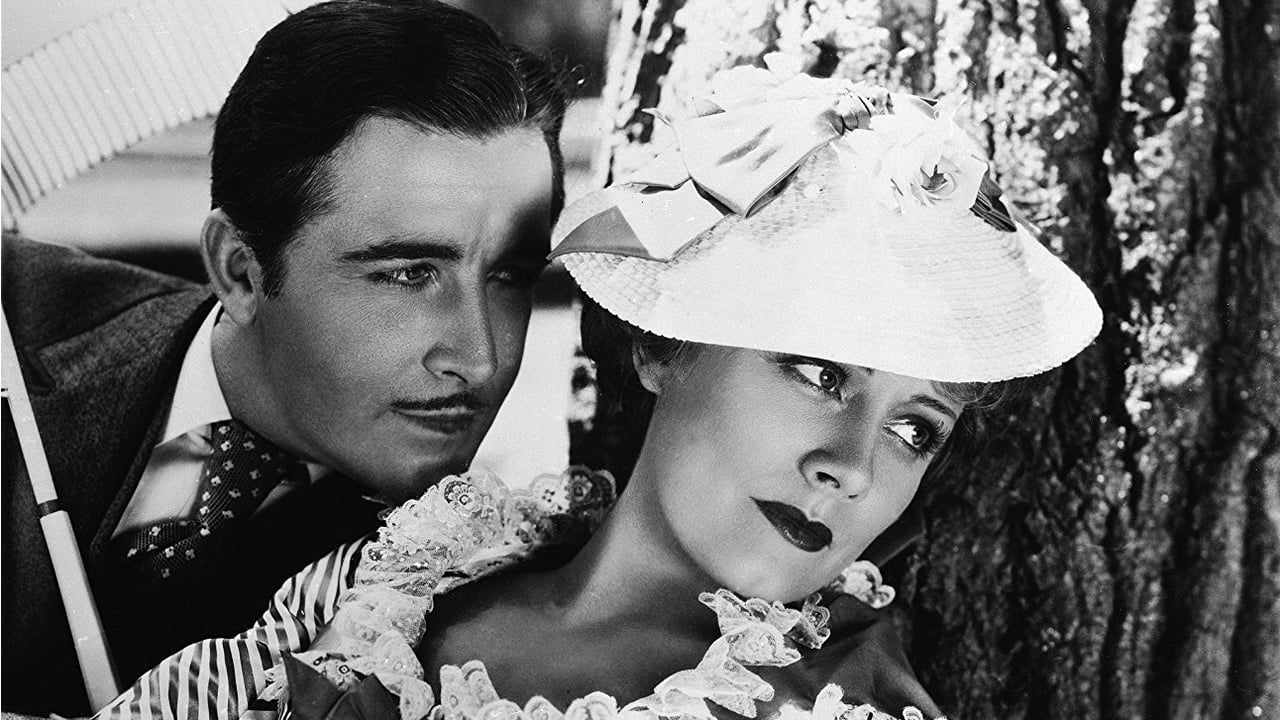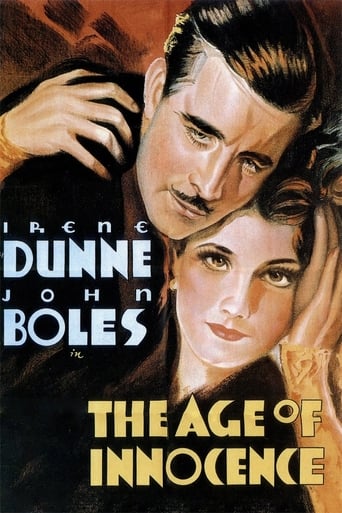



This movie was so-so. It had it's moments, but wasn't the greatest.
View MoreYour blood may run cold, but you now find yourself pinioned to the story.
View MoreThe movie turns out to be a little better than the average. Starting from a romantic formula often seen in the cinema, it ends in the most predictable (and somewhat bland) way.
View MoreBy the time the dramatic fireworks start popping off, each one feels earned.
View MoreThis "Age of Innocence" from 1934, of course, cannot even approach the sumptuous beauty.amazing acting, and rich story-telling of the Martin Scorsese "Age of Innocence" from 1993 starring Daniel Day-Lewis, Winona Ryder, and Michelle Pfeiffer.The 1934 movie stars Irene Dunne as Ellen, John Boles as Newland, and Julie Haydon as May.The story is told in flashback by the elderly Newland. As a young attorney in the late 1800s, he was engaged to May when her cousin Ellen came to visit from Europe. She plans to divorce her husband and is a social outcast, as these things were never done. Newland and Ellen fall in love. Do they defy convention and marry? Or does Newland marry May as promised?Irene Dunne is lovely as Ellen. She was an actress who could do comedy and drama. John Boles was a huge star and not a tremendous actor. That kind of look was considered attractive way back when; today it has gone out of style. There are good performances, but there is no way to watch this film after seeing the Scorsese film. It is studio-made, looks dull, and is dull. This is a story with a great deal of depth that seems untouched here -- lots going on underneath all the gentility, the trap of conventions -- here told as an ordinary story.Helen Westley is wonderful as the cousins' grandmother, as is Laura Hope Crews as Dunne's aunt and May's mother. Lionel Atwill is also on hand as a married man who is a friend of Dunne's, an unacceptable situation.The novel was also adapted into a play, on Broadway starring Katherine Cornell as Ellen and Franchot Tone as Newland.If you haven't seen the stunning Scorsese film, see it.
View MoreTechnically speaking, this is a generally well made film. The acting (apart from some serious over-melodramatic acting from John Boles) was good and the entire production looked marvelous. So why, then, only a score of 5? Well, the story seems to try hard to make an excellent point--only to have it undone by plot holes that just don't make a lot of sense. Perhaps in the original Edith Wharton novel this is not the case, but here the film seems to be missing something.The film begins with Boles ("Newland Archer") becoming engaged with his long time sweetheart, May. They seem like a happy couple and they are going into the upcoming marriage with not a care in the world other than wanting to marry sooner than later. At about the same time, May's cousin (Countess Ellen Olenska--played by Irene Dunne) is arriving from Europe and there is a great scandal because Mrs. Olenska is planning on divorcing her husband--something that polite society at the time would NEVER condone. It is interesting that we never see her husband nor do we really know much about their marriage other than the fact that she is unhappy and wants out--even though her family is strongly in favor of her remaining married. The family's wishes, oddly, are NOT because of a love for Olenska but because they were more concerned about how the scandal would ruin their good name! Many, in fact, were totally unconcerned about her soon to be ex-husband nor about adultery--just what others would think. This hypocrisy made for an excellent theme and I wish the film had really worked more on this angle.Unfortunately, out of the blue, Archer suddenly announces to the Countess that he loves her!! Where this comes from makes no sense at all--especially since his bride to be is a sweet lady who has done no one wrong. Yet despite this profession, Archer still marries May and they go on their honeymoon. During this time, Archer is distant and quite frankly a major jerk--pining for the Countess and ignoring his poor wife. Frankly, any sympathy you had for the Countess and her divorce is quickly lost because she, too, is conspiring with Archer to run away together. So instead of an excellent story of hypocrisy, the story becomes a story of lust and selfishness--making the viewer really hate Boles and Dunne (especially Boles). All the great buildup of the last hour of the film is practically thrown away when this affair appears out of nowhere.So what, at this point, is the point of the film? This ambiguity was a serious deficiency with the film. Had Archer never married May and then run off with the Countess, then you might have had a lot of sympathy for the couple. As is, they just seemed nasty and selfish. And the overall message seemed muddled. Were they trying to excuse away adultery or somehow trying to be pro-marriage? I really don't know. Had Archer acted rationally and consistently and less like a weasel, then this message would have been much more clear. As a result, it seriously deadens the impact of this film. It COULD have been much, much better.
View MoreIrene Dunne shines in this fine(one must remember it was the post-code 1930s)adaptation of the Edith Wharton novel, as Countess Ellen Olenska, an american born member of New York's high society, who was raised and married in Europe, far way from that city's strict society conventions, now an outsider in her own family. She returns to New York city because she wants to divorce her polish aristocrat husband, where she falls in love with young lawyer Newland Archer, her cousin's fiancé.John Boles, as usual, is just so-so as Newland Archer, although I must say, that upon watching the movie I felt he was much more effective when impersonating him in his old age. This actor always reminds me of Robert Taylor, because although the latter achieved superstar stardom and had better looks, their acting abilities and inexpressiveness are roughly equivalent. As well, both served as "escorts" in many star vehicles of notable 1930s female stars: Irene Dunne, Barbara Stanwyck, etc.Miss Dunne, an excellent comedienne and dramatic actress, had previously worked with Boles in the 1932 weepie "Back Street", and this film's plot is in the same category. She looks very beautiful indeed in period clothing. Julie Haydon is rightly "controlled" and restrained, as her cousin May.Helen Westley gives the greatest performance among the supporting players, as Old Dowager Mrs. Manson Mingott, both Countess Olenska's and May's understanding and very warm grandmother. Laura Hope Crews is very good as Dunne's stuffy and very concerned aunt (and May's mother), and Lionel Atwill plays an unscrupulous "married man of bad reputation" who befriends Dunne, in spite of the scandal it may cause, in the opinion of her family.Recommended viewing for '30s movie fans.
View MoreAdaptation from a novel and play, this 1930s social drama is performed as a flashback into 1870s New York. SPOILER Irene Dunne and John Boles are cast as ill-fated lovers who are unable to marry because of the pressure of family and society to avoid scandal. Irene is beautiful but hard to believe as a woman who has just left her husband and is now deciding whether she will ask for a divorce. She plays neither the injured innocent nor the wanton vixen. SPOILER Boles is almost unbearable and his character cannot build up sufficient courage to abandon his fiance and later his wife. SPOILER In the end he cannot even muster the courage for a late in life reunion and possible happiness. Lionel Atwill is hardly realistic as the other love interest -- was there no one else in Hollywood that could have played this role? Helen Westley does a great job as Granny. Poor editing in places. Recommended for those who need to see all of Irene Dunne's work and anyone interested in societal values in 1870s New York.
View More